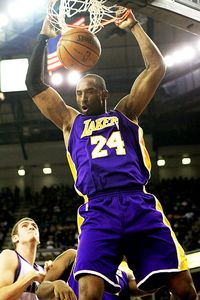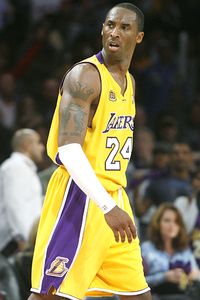Last week, my partner in crime wrote a column about how uncomfortable she will be when Kobe Bryant receives the 2008 MVP award. Well, no disrespect to Jemele (Ms. Hill to those of us who know her), but Kobe Bryant will not win the MVP this year. And if recent history proves consistent, he might finish behind Alonzo Mourning in the voting.
[+] Enlarge

Jed Jacobsohn/Getty Images
Kobe Bryant is to the MVP what Ralph Nader is to the presidency.
Truth is Kobe Bryant will never win the MVP of the league. He is hated too much. Hated by those who cast votes. Hated too much by those he plays against. And the two All-Star Game MVPs he's won, well, they don't count in this scenario. Voting Kobe as the best basketball player in the world for a day is one thing, honoring him with that same title for an entire season … in the infamous words of Bobby Brown's ex-wife: "Oh, hell to the No!"
Writers won't honor Kobe like that, not even when in good consciousness they want to or would like to. As one writer said to me when the subject was brought up in conversation, very apropos for an election year, "Kobe's electability quotient is zero." In other words, he's Ralph Nader.
How is hate justified? Easy, by being consistent. Which is why this year will be no different than the past two. Because if we are honest (and this goes to Jemele's point), if we look at what Kobe Bryant has done in the past two seasons without winning the MVP, there should be no way he can win it this year. Which leads us back to the hate: A man averages 35.4 ppg, the eighth-highest average in the history of the league; he gives you 5.3 rebounds, 4.5 assists and 1.8 steals; he has 27 games of 40-plus points, has one month where he averages 43.4 ppg, scores 81 in one game and outscores an entire team in another (the 62-point game against Dallas where he sat out the fourth quarter); he is on the all-defensive first team (something not one of the other players in the MVP running is included on); and he leads a CBA-built team to the playoffs. The man has a season that no one is likely to see for another generation and he comes in fourth in the MVP voting that year.
That same man, the very next year, averages 31.6 points, 5.7 rebounds, 5.4 assists and 1.4 steals for the "fedora trick"; he has 10 games of 50-plus points, only the second person in NBA history to do so in a single season (including a four-in-a-row stretch that hadn't been seen in more than 20 years); he makes the all-defensive first team again; and this time he takes a YBA-built squad to the playoffs. In a season that many claim is more "complete" than the season before, the man this time comes in third in the MVP voting.
How bad is it for Kobe? In a 2004-05 season in which Kobe averaged 27.6 points, 5.9 rebounds and 6.0 assists, P.J. Brown -- yes, you read right -- received more MVP votes than he did, and Brown received only one vote. How many games did the Hornets win that year? 18.
(And it's not just the sportswriters. In that never-to-be-seen-again 2005-06 season, the GMs around the league, who have their own MVP voting, had Bryant fifth on their ballots.)
And nothing is going to make this season any different.
[+] Enlarge

AP Photo/Matt Sayles
Kobe Bryant finished behind P.J. Brown in the 2004-05 MVP voting. Yes, you read that correctly.
So yes, there is an "earned the right" clause that goes on in all MVP voting, just as there is that same "clause" that exists in all professions and walks of life. But it will not apply to Kobe Bryant. Not this year or any other year. He's not Denzel, and this isn't "Training Day." And although there are those who say that Kobe is in a different place now, that the world does not "resent" him the way that it did, that the Colorado incident is behind him and that the Kobe who wears No. 24 is different than the one who wore No. 8, their delusion will only make the situation worse. For it brings false hope. In sticking with the Academy Awards analogy: Kobe Bryant is Martin Scorsese … before "The Departed."
So the reality is this: As nice -- and I mean nice in a This-dude-is-on-some-beyond-Steve-Nash level -- as Chris Paul's game has been all season long (his full name during broadcasts and highlight shows has become "MVP candidate Chris Paul") his season can't compare to Kobe's past two. Yes, he's elevated his team to a height that no one expected, but can you name one player on the Lakers (not including Kobe) over the past three years who is as good or has played as well as David West has this season? Hell, name one who has played as well as Peja Stojakovic or Tyson Chandler.
Plus how will the voters justify not giving CP3 the MVP in a season when his numbers are better than Nash's were the two seasons he got back-to-back MVPs? Paul's 21.5 points, 11.5 assists, 4.0 rebounds, 2.7 steals and 2.5 turnovers are better in totality than the 15.5, 11.5, 3.4, 1.0 and 3.3 Nash put up in 2004-05 and the 18.8, 10.5, 4.2, 0.8 and 3.5 he posted during the 2005-06 season. And CP's team is in position to do what Nash's team did when he came back to Phoenix: earn the top seed in the West. So if Nash won 62 games and the West in '05-06 with inferior numbers to Paul's, how does the league not give Paul the award if his team wins 60 and has the best record in the West?
And trust, CP3's electability is off the charts compared to Kobe's. His MVP approval rating is sic, while Kobe's is sick. So Chris, congrats, enjoy the Maurice Podoloff. The voters love you.
And that's not necessarily because of who CP (or KG if you want to toss him into this conversation) is as much as it is because of who Kobe is: the "8" they love to hate. Someone less understood than a villain, and someone for whom those who vote have less tolerance when it comes to separating what he does from who he is. It's the same reason why upon eligibility into the Hall of Fame, Roger Clemens will receive more first-ballot votes than Barry Bonds. It will have more to do with how much more Roger was/is/remains beloved than Barry by those who will have the power to vote them into immortality than it will race or the level of crime either one committed while playing.
Is it right? Fair? Impartial? No. It's life. And for Kobe, it's become his life.
In sports, in the end, whether we want to acknowledge it honestly or not, athletes put their legacies in the hands of those who have the power to hate them. And in those situations, what they do on the court or field, whether we are talking MVP or Hall of Fame (or Oscars), what they do takes a backseat to who they are. Their careers become a popularity contest, a "likability" raffle lying in wait for the hate to die. Which it never really does. And in the past five years in professional sports, no athlete (with the exception of maybe Bonds or T.O.) has been more hated and hated on than Kobe Bryant.
Don't believe me? Watch what happens when he doesn't win the MVP … again.
Scoop Jackson is a columnist for Page 2.



 What they did not know was that the CEO of Facebook; Mark Zuckerberg was going to pop-in to the facebook developers meetup meeting. The 23-year-old facebook CEO fielded questions from the developers and enthusiasts at the meeting. Suprise! If you talk to anyone who hasn’t been living under a rock and understands what facebook is trying to do; the developers are key in the equation.
What they did not know was that the CEO of Facebook; Mark Zuckerberg was going to pop-in to the facebook developers meetup meeting. The 23-year-old facebook CEO fielded questions from the developers and enthusiasts at the meeting. Suprise! If you talk to anyone who hasn’t been living under a rock and understands what facebook is trying to do; the developers are key in the equation. 
